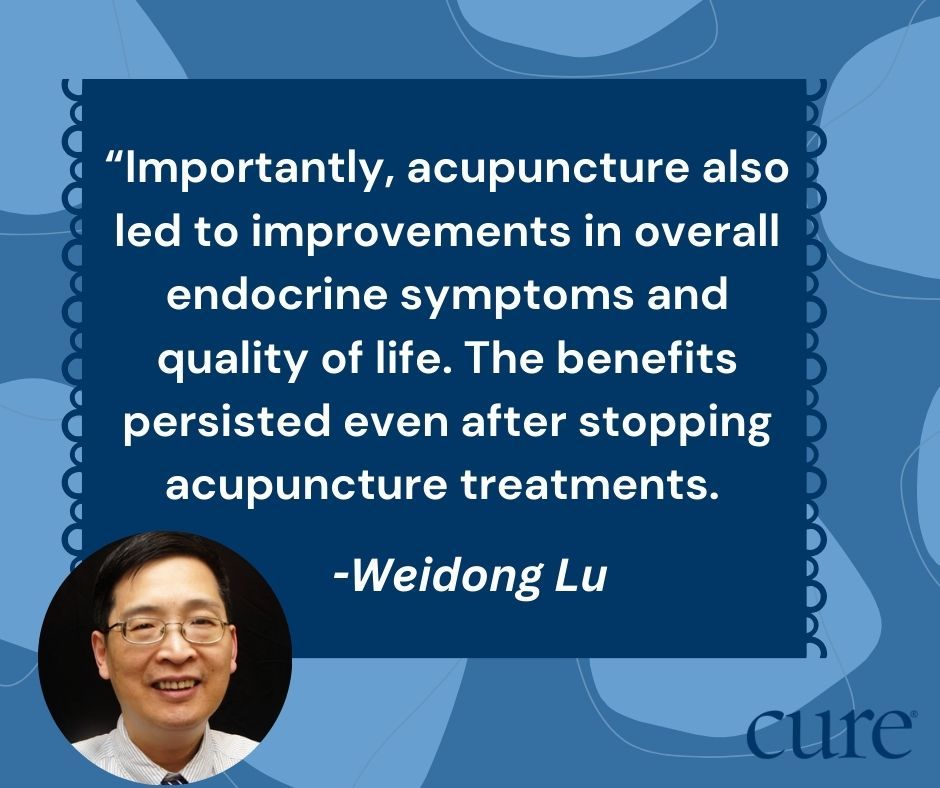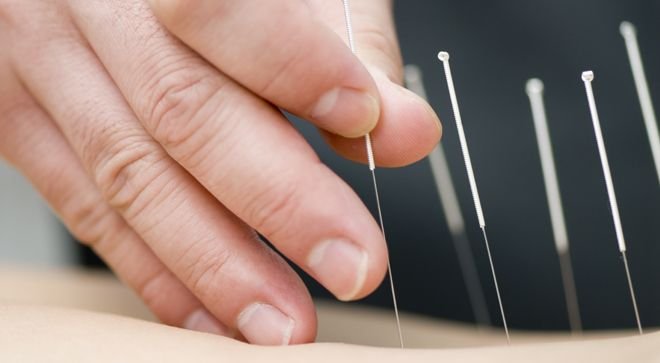Acupuncture may be beneficial for breast cancer patients experiencing hot flashes and other treatment-related side effects, according to a recent study published in the journal Neurology. cancer.
The study included women with stages 0 to 3 breast cancer, some of whom received 20 acupuncture treatments over a 10-week period, while others received usual care. Acupuncture is an integrative therapy that involves inserting small needles into different parts of the body to relieve specific symptoms. Results showed that the acupuncture group experienced improvements in endocrine-related side effects and hot flashes.
In a recent interview with CURE® study author Weidong Lu, Ph.D., Chief Oncology Acupuncturist at the Leonard P. Zakim Center for Integrative Medicine and Healthy Living at Dana-Farber Cancer Institute, he discussed research findings about acupuncture for breast cancer symptoms and what patients need to know.
Cure®: Can you give us an overview of hot flashes in women with breast cancer?
RouxHot flashes are sudden sensations of warmth, often accompanied by sweating and facial flushing, that are common in women with breast cancer who are receiving endocrine (hormonal) therapy. Hot flashes occur when estrogen levels suddenly fall due to treatments such as tamoxifen or aromatase inhibitors.
Hot flashes affect up to 80% of women undergoing these treatments. They can have a significant impact on quality of life by disrupting sleep, causing discomfort and embarrassment, and interfering with daily activities and work. The frequency and severity of hot flashes lead some women to consider premature cessation of endocrine therapy.
What led your team to consider acupuncture as a viable option for this condition?
Acupuncture has shown promise in managing menopausal symptoms in previous small studies. Acupuncture is a non-pharmacological approach without the side effects of medications sometimes used for hot flashes. Furthermore, acupuncture is widely available across different cultures and health systems. Our team was interested in rigorously evaluating the effectiveness of acupuncture in a larger, multinational study to determine whether it could mitigate this common and troublesome side effect of breast cancer treatment.
Can you give us an overview of the findings, and specifically what patients should know about them?
Our study found that women who received acupuncture experienced greater improvements in the frequency and severity of their hot flashes compared to treatment as usual. After 10 weeks, 64% of the acupuncture group showed a significant reduction in hot flashes, compared with just an 18% response rate in the control group. [who received standard of care]Importantly, acupuncture also improved overall endocrine symptoms and quality of life, benefits that persisted even after acupuncture was discontinued.
Patients should know that acupuncture is a safe and effective option for managing hot flashes and other side effects of endocrine therapy.
What advice would you give to people considering acupuncture for hot flashes or other symptoms related to endocrine therapy?
Patients are encouraged to discuss acupuncture as a complementary therapy with their oncologist. Find a licensed acupuncturist with experience treating patients. [with cancer].
Dr. Weidong Lu spoke to CURE® about how acupuncture can help women with breast cancer who experience hot flashes.

The majority of women in our study received treatments twice a week for 10 weeks. Individual responses vary, but many women see improvements within a few weeks. Acupuncture is generally very safe, but patients should tell their acupuncturist about all medications and treatments they are receiving.
Anything else you’d like to add?
“We want to emphasize that not only does this study show that acupuncture is effective for hot flashes, but readers should also note the impact acupuncture has on multiple symptoms and improved overall quality of life. Acupuncture not only reduced hot flashes, but for many women, it also provided benefits including improvements in other hormonal symptoms, mood, and overall health. This comprehensive impact makes acupuncture an attractive option for supporting breast cancer survivors through endocrine therapy.”
For more cancer updates, research and education news, subscribe to the CURE® newsletter here.

